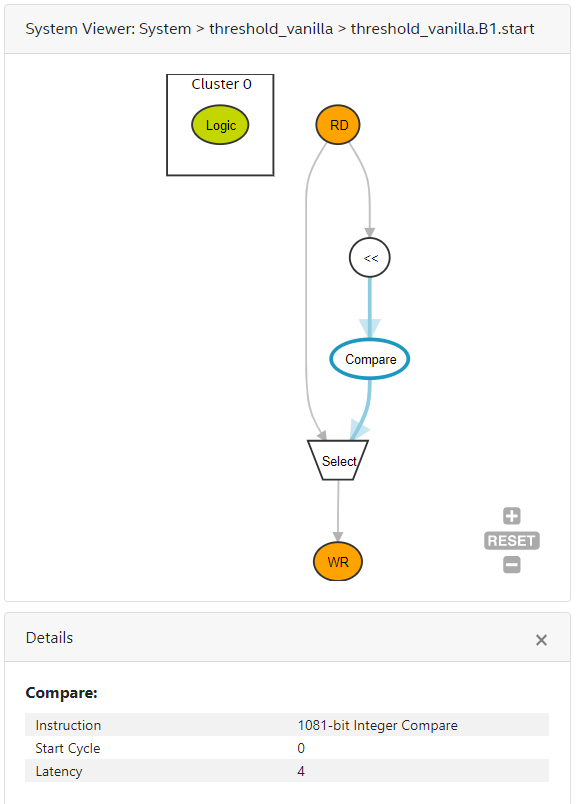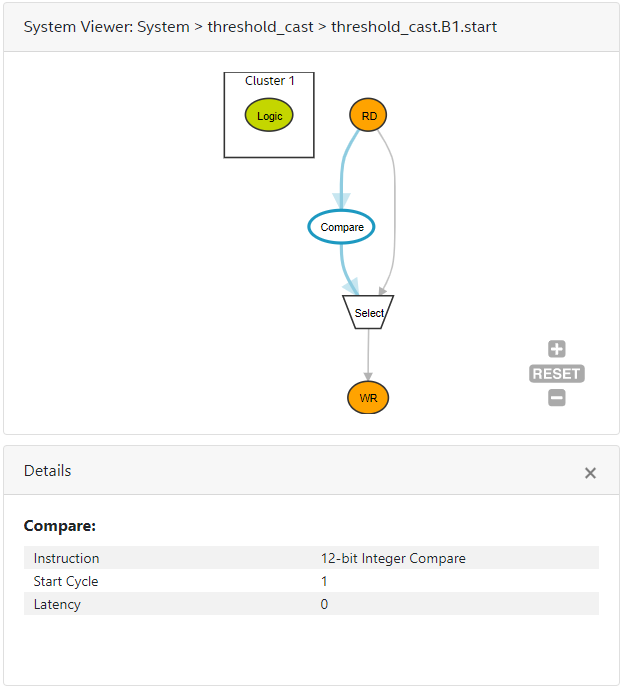Intel® High Level Synthesis Compiler Pro Edition: Reference Manual
ID
683349
Date
12/19/2022
Public
A newer version of this document is available. Customers should click here to go to the newest version.
1. Intel® HLS Compiler Pro Edition Reference Manual
2. Compiler
3. C Language and Library Support
4. Component Interfaces
5. Component Memories (Memory Attributes)
6. Loops in Components
7. Component Concurrency
8. Arbitrary Precision Math Support
9. Component Target Frequency
10. Systems of Tasks
11. Libraries
12. Advanced Hardware Synthesis Controls
13. Intel® High Level Synthesis Compiler Pro Edition Reference Summary
A. Advanced Math Source Code Libraries
B. Supported Math Functions
C. Cyclone® V Restrictions
D. Intel® HLS Compiler Pro Edition Reference Manual Archives
E. Document Revision History of the Intel® HLS Compiler Pro Edition Reference Manual
6.1. Loop Initiation Interval (ii Pragma)
6.2. Loop-Carried Dependencies (ivdep Pragma)
6.3. Loop Coalescing (loop_coalesce Pragma)
6.4. Loop Unrolling (unroll Pragma)
6.5. Loop Concurrency (max_concurrency Pragma)
6.6. Loop Iteration Speculation (speculated_iterations Pragma)
6.7. Loop Pipelining Control (disable_loop_pipelining Pragma)
6.8. Loop Interleaving Control (max_interleaving Pragma)
6.9. Loop Fusion
11.4.1.1. Integration of an RTL Module into the HLS Pipeline
11.4.1.2. RTL Module Interfaces
11.4.1.3. RTL Reset and Clock Signals
11.4.1.4. Object Manifest File Syntax
11.4.1.5. Mapping HLS Data Types to RTL Signals
11.4.1.6. HLS Emulation Models for RTL-Based Functions
11.4.1.7. Potential Incompatibility between RTL Modules and Partial Reconfiguration
11.4.1.8. Stall-Free RTL
11.4.1.9. RTL Module Restrictions and Limitations for HLS Libraries
13.1. Intel® HLS Compiler Pro Edition i++ Command-Line Arguments
13.2. Intel® HLS Compiler Pro Edition Header Files
13.3. Intel® HLS Compiler Pro Edition Compiler-Defined Preprocessor Macros
13.4. Intel® HLS Compiler Pro Edition Keywords
13.5. Intel® HLS Compiler Pro Edition Simulation API (Testbench Only)
13.6. Intel® HLS Compiler Pro Edition Component Memory Attributes
13.7. Intel® HLS Compiler Pro Edition Loop Pragmas
13.8. Intel® HLS Compiler Pro Edition Scope Pragmas
13.9. Intel® HLS Compiler Pro Edition Component Attributes
13.10. Intel® HLS Compiler Pro Edition Component Default Interfaces
13.11. Intel® HLS Compiler Pro Edition Component Invocation Interface Control Attributes
13.12. Intel® HLS Compiler Pro Edition Component Macros
13.13. Intel® HLS Compiler Pro Edition Systems of Tasks API
13.14. Intel® HLS Compiler Pro Edition Pipes API
13.15. Intel® HLS Compiler Pro Edition Streaming Input Interfaces
13.16. Intel® HLS Compiler Pro Edition Streaming Output Interfaces
13.17. Intel® HLS Compiler Pro Edition Memory-Mapped Interfaces
13.18. Intel® HLS Compiler Pro Edition Load-Store Unit Control
13.19. Intel® HLS Compiler Pro Edition Arbitrary Precision Data Types
B.1. Math Functions Provided by the math.h Header File
B.2. Math Functions Provided by the extendedmath.h Header File
B.3. Math Functions Provided by the ac_fixed_math.h Header File
B.4. Math Functions Provided by the hls_float.h Header File
B.5. Math Functions Provided by the hls_float_math.h Header File
B.6. Default Rounding Schemes and Subnormal Number Support
8.2.1. Arbitrary Precision Fixed-Point Literals in Operations
When you use the ac_fixed datatype to declare literals in your component, the compiler expands the literal, regardless of the size you set for the ac_fixed literal. To keep the compiler from expanding the literal, cast the literal to an ac_fixed data type.
For example, the literal in the following code snippet is treated as a double data type:
Using Fixed12 = ac_fixed<12, 6, true>;
component Fixed12 threshold_vanilla(Fixed12 a){
if (a < 12.7) {
return a;
} else {
return 12.7;
}
}In this code snippet, the 12-bit ac_fixed value is compared with 12.7. The literal 12.7 is treated as a double, with value 12.699999…. This literal is converted to a fixed-point to be compared with a, but because the literal is unconstrained, the compiler chooses a large fixed-point value and this can result in a large comparison:

You can force a smaller comparison by casting the literal 12.7 to an appropriately-sized ac_fixed data type:
Using Fixed12 = ac_fixed<12, 6, true>;
component Fixed12 threshold_cast(Fixed12 a){
if (a < (Fixed12)12.7) {
return a;
} else {
return 12.7;
}
} 
For more details about the impact of choosing single precision literals and functions over their double precision counterparts, review the following tutorial:
<quartus_installdir>//hls/examples/tutorials/best_practices/single_vs_double_precision_math